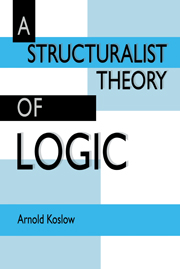Book contents
- Frontmatter
- Contents
- Preface
- Part I Background
- Part II Implication relations
- 5 The theory of implication relations
- 6 Implications: Variations and emendations
- 7 Familiar implication relations: Deducibility and logical consequence
- 8 Implication relations: Direct and derived
- 9 Implications from implications
- 10 Implication relations and the a priori: A further condition?
- Part III The logical operators
- Part IV The modal operators
- Appendix A An implication relation for the integers in the programming language BASIC
- Appendix B Symmetric sequents as products of implication relations and their duals
- Appendix C Component-style logical operators and relevance
- Notes
- Bibliography
- Index
8 - Implication relations: Direct and derived
Published online by Cambridge University Press: 05 May 2010
- Frontmatter
- Contents
- Preface
- Part I Background
- Part II Implication relations
- 5 The theory of implication relations
- 6 Implications: Variations and emendations
- 7 Familiar implication relations: Deducibility and logical consequence
- 8 Implication relations: Direct and derived
- 9 Implications from implications
- 10 Implication relations and the a priori: A further condition?
- Part III The logical operators
- Part IV The modal operators
- Appendix A An implication relation for the integers in the programming language BASIC
- Appendix B Symmetric sequents as products of implication relations and their duals
- Appendix C Component-style logical operators and relevance
- Notes
- Bibliography
- Index
Summary
Projective implication
One of the very simplest implication relations can be obtained by regarding an element B of a set S as implied by finitely many members listed as A1, …, An, just in case B is Aj for some j in {1, …, n}. The verification of the conditions for implication relations is straightforward.
Millean implication
This is a kind of implication relation for which A1, …, An implies B if and only if some Aj implies B for some j in {1, …, n} (see Chapter 4, note 2).
Exercise 8.1. Let “#” any reflexive and transitive binary relation on a set S of at least two members. Let “⇒#” hold between A1, …, An and B if and only if Aj # B for some j in {1, …, n}. Show that “⇒#” is a Millean implication relation.
Bisection implication
A much more theoretically interesting example whose properties we shall now study in some detail arises from a consideration of the various ways in which a nonempty set S can be partitioned into two nonempty, mutually exclusive subsets.
Information
- Type
- Chapter
- Information
- A Structuralist Theory of Logic , pp. 45 - 52Publisher: Cambridge University PressPrint publication year: 1992
